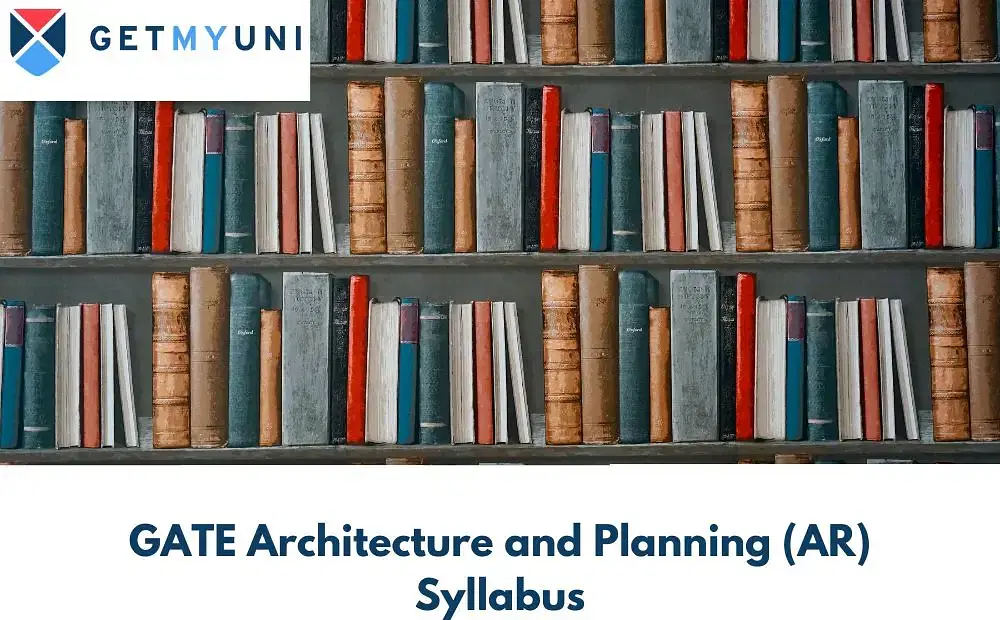GATE Architecture and Planning (AR) syllabus 2025 comprises sub-sections which include Architecture and Design, Building Materials, Construction and Management, Building and Structures, Environmental Planning and Design, Urban Design and more.
Table of Contents
GATE Architecture and Planning syllabus 2025 covers topics such as Building Materials, Construction and Management, Architecture and Design, Tools and techniques of surveys, Building services, Electricity and Communications, and many more related to planning and architecture.
A total 8 sub-sections are included in the Architechture and Planning syllabus of GATE exam 2025, they are as follows: Architecture and Design, Building Materials, Construction and Management, Building and Structures, Environmental Planning and Design, Urban Design and more.
General Aptitude Section Syllabus
The students can check the general aptitude section syllabus for GATE Architecture and Planning 2025 from the pointers mentioned below.
- There will be a total of 10 questions in this section.
- The questions will be of 1 mark and 2 marks.
- The total marks for this section are 15.
- There will be 2 parts in this section. They are Verbal Ability and Numerical Ability.
- Topics for verbal ability include Sentence completion, English grammar, Critical Reasoning, Verbal analogies, Word Groups and Instructions.
- Topics for Numerical ability include Numerical Estimation, Numerical Reasoning, Data Interpretation and Numerical Computation.
Also Check: GATE Engineering Sciences Syllabus 2025
GATE Architecture and Planning (AR) Section-wise Syllabus
The GATE syllabus for Architecture and Planning consists of 8 sub-sections. They are:
- Architecture and Design
- Building Materials, Construction and Management
- Building and Structures
- Environmental Planning and Design
- Urban Design
- Urban Planning and Housing
- Planning Techniques and Management
- Services, Infrastructure and Transportation
The above-mentioned sub-sections must be covered in your preparation and the important topics to be prepared under each section are tabulated below.
| Sections | Topics |
| Architecture and Design | Principles of art and architecture, Visual composition in 2 D and 3 D, site planning, Barrier-free design, Circulation-horizontal and vertical, Organization of space, Computer Graphics, Architectural Graphics, Planning and design considerations for different building types, Anthropometrics, National Building Code and Building Codes. |
| Influence of modern art on architecture, postmodernism, Recent trends in contemporary architecture, Architectural developments since the industrial revolution, Works of renowned national and international architects, Elements, Architectural styles, International styles, Postmodernism, Deconstruction in Architecture. | |
| Building Materials, Construction and Management | Behavioural applications and characteristics of various building materials, Building construction techniques, methods and details, estimation, valuation, specification, professional practice, Project management techniques, Building systems Prefabrication of Building elements, Principles of Modular Coordination, |
| Buildings and Structures | Principles of the strength of materials, Structural elements in RCC and steel, Principles and design of disaster-resistant structures, Principles of prestressing, High rise and long-span structures gravity and lateral load resisting systems, Elastic and Limit state design |
| Environmental Planning and Design | Concepts of environmental impact analysis, Ecosystem-natural and manmade, Principles of lighting and illumination, Thermal comfort, Ventilation and air movement solar architecture, Environmental pollution-types, causes and controls, Climate responsive design, Ecological principles, Environmental considerations in Planning and design, Building performance simulation and evaluation. |
| Urban Design | Public perception, public realm, Elements of the urban built environment, Historical and modern examples of urban design, Townscape, Site planning, landscape design, concepts and theories of urban design, Urban design interventions for sustainable development and transportation, |
| Urban Planning and Housing | Housing, principles, concepts and examples of a neighbourhood, Residential densities, National housing policies, Standards for housing and community facilities, Principles of urban planning and theories, Sustainable urban development, Programs and schemes, Types of various plans, Planning process, regional plan, |
| Planning Techniques and Management | Graphic presentation of spatial data, Tools and techniques of surveys, Methods of non-spatial and spatial data analysis, Decision support system and Land Information system, Law of Demand and supply of land and its use in planning, Techniques of financial appraisal, Social, environmental, cost-benefit analysis and Economical, Urban Economics, Applications of G.I.S and Remote Sensing Techniques in urban and regional planning, management of infrastructure projects. |
| Services, Infrastructure and Transportation | Building services- Sewage and drainage systems, water supply, Principles of internal and external drainage systems, Building safety and security systems and firefighting systems, Principles of water supply and sanitation systems, sewage disposal methods, Principles and design of stormwater drainage system, Methods of solid waste management, Road capacity, Process and principles of Transportation Planning and Traffic Engineering, Traffic analysis and design considerations, Travel demand forecasting, Design of roads, Grade separators and parking areas, Mass transportation planning, Hierarchy of roads and level of service, Urban infrastructure- Water, supply, Transportation, sewage, solid waste management, electricity and communications, Water supply and Distribution systems, Recycling and Reuse of solid waste, Intelligent Transportation Systems, Hierarchy of roads and level of service, Pedestrian and slow-moving traffic planning. |
Also Check: GATE Geomatics Engineering Syllabus 2025
GATE Architecture and Planning Exam Pattern
The GATE 2025 exam pattern must be carefully analysed by the candidates before they start preparing for their tests. It will be a Computer Based Test (CBT). There are a total of three sections which are General Aptitude, Mathematics and Subject-based questions. There will be a total of 65 questions in the exam paper and the score will be out of 100. The type of questions will be Multiple Choice Questions (MCQs) and Numerical Type Questions (NATs). We will guide you with the sections and total marks for the sections.
| Sections | Total Marks |
| General Aptitude | 15 marks |
| Subject Based Questions | 85 marks |
In the General Aptitude section, there will be 5 questions of 1 mark each and 5 questions of 2 marks each. In subject-based questions, there will be 25 questions of 1 mark each and 30 questions of 2 marks each.
Read More: Benefits of Writing GATE 2025
Books for GATE Architecture and Planning Preparation
In this section, we will guide you with some of the best GATE Architecture books that you can refer to while preparing for the GATE test. A table showing the name of the books and author name are provided below:
| Books | Author |
| Becoming a Landscape Architect: A Guide to Careers in Design | Kelleann Foster |
| Building Services and Equipment | Fred Hall |
| Town Planning | S. C. Rangwala |
| Environmental Studies: From Crisis to Cure | R. Rajagopalan |
| Building Services and Equipment: Volume 2 | Fred Hall |
| Urban Transportation: Planning, Operation and Management | D. Johnson Victor and S. Ponnuswamy |
| Building Construction | Arun Kumar Jain, Ashok Kumar Jain and B. C. Punmia |
| Design of Steel Structures | S K Duggal |
| Urban Pattern: City Planning and Design | Gallion |
| Strength of Material | R S Khurmi |
| Manual of Tropical Housing and Building | Kellean Foster |
Read More: GATE 2025 Books
Preparation Tips to crack GATE Architecture and Planning Test
Preparation tips that will make your GATE 2025 Architecture and Planning preparation task a lot easier are as follows.
Start off with easy topics
- While preparing for your test, start off with the topics that you feel are easy to grasp and learn.
- After finishing off with the easy topics you can move forward with the difficult questions.
- Always remember to not ignore the easy questions as the exam paper will comprise of easy questions too.
Be thorough with the basics
- Candidates must make sure that they are thorough with the basics first.
- The foundation is really important and sees that you are cleared with all the basic topics and questions.
Mock Tests
- Mock tests will help you in assessing your performance level.
- Solving mock tests after each topic that you prepare will make you realise how much preparation you need to take on that particular topic.
- Solve as many mock tests as possible as it will keep track of your performance level and guide you on the weak areas that you will need to improve.
Revise the topics well
- Candidates can revise the topics as soon as they are done with the preparation.
- Revising topics help you to brush up on all the important topics and guide on topics that you may have forgotten in case.
- This practice helps you in a very big way in your test and come out with flying colours.
Also Check: GATE Qualifying Marks 2025








![Indian Institute of Technology, [IIT] Bombay](https://media.getmyuni.com/azure/college-image/small/indian-institute-of-technology-iit-bombay.jpg)

![Indian Institute of Technology, [IIT] Kanpur](https://media.getmyuni.com/azure/college-image/small/indian-institute-of-technology-iit-kanpur.jpg)
![Indian Institute of Technology, [IIT] Kharagpur](https://media.getmyuni.com/azure/college-image/small/indian-institute-of-technology-iit-kharagpur.jpg)

























POST YOUR COMMENT